Deck 7: Sequences, Series, and Probability
Question
Question
Question
Question
Question
Question
Question
Question
Question
Question
Question
Question
Question
Question
Question
Question
Question
Question
Question
Question
Question
Question
Question
Question
Question
Question
Question
Question
Question
Question
Question
Question
Question
Question
Question
Question
Question
Question
Question
Question
Question
Question
Question
Question
Question
Question
Question
Question
Question
Question
Question
Question
Question
Question
Question
Question
Question
Question
Question
Question
Question
Question
Question
Question
Question
Question
Question
Question
Question
Question
Question
Question
Question
Question
Question
Question
Question
Question
Question
Question

Unlock Deck
Sign up to unlock the cards in this deck!
Unlock Deck
Unlock Deck
1/92
Play
Full screen (f)
Deck 7: Sequences, Series, and Probability
1
Write an expression for the apparent nth term of the sequence.(Assume that n begins with 1.) 
A)
B)
C)
D)
E)

A)

B)

C)

D)

E)

D
2
Determine whether the sequence is arithmetic.If so, find the common difference.(Assume that n begins with 1.) 
A) -1
B) -8
C) 8
D) 1
E) not arithmetic

A) -1
B) -8
C) 8
D) 1
E) not arithmetic
D
3
Find the indicated term of the sequence. 
A) 106
B) -110
C) -122
D) 18
E) -112

A) 106
B) -110
C) -122
D) 18
E) -112
B
4
Find a formula for an for the arithmetic sequence. 
A)
B)
C)
D)
E)

A)

B)

C)

D)

E)


Unlock Deck
Unlock for access to all 92 flashcards in this deck.
Unlock Deck
k this deck
5
Find the sum. 
A) 16
B) 32
C) 27
D) 11
E) 12

A) 16
B) 32
C) 27
D) 11
E) 12

Unlock Deck
Unlock for access to all 92 flashcards in this deck.
Unlock Deck
k this deck
6
Write the given series in summation notation. 
A)
B)
C)
D)
E)

A)

B)

C)

D)

E)


Unlock Deck
Unlock for access to all 92 flashcards in this deck.
Unlock Deck
k this deck
7
Suppose that the annual payroll  (in billions of dollars) of new car dealerships in the United States from 2000 to 2005 can be approximated by the model
(in billions of dollars) of new car dealerships in the United States from 2000 to 2005 can be approximated by the model 
 where
where  represents the year, with
represents the year, with  corresponding to 2000.Find the total payroll from 2000 to 2005 by evaluating the sum
corresponding to 2000.Find the total payroll from 2000 to 2005 by evaluating the sum  Round your answer to the nearest ten million dollars.
Round your answer to the nearest ten million dollars.
A) $343.70 billion
B) $292.10 billion
C) $246.50 billion
D) $298.10 billion
E) $387.60 billion
 (in billions of dollars) of new car dealerships in the United States from 2000 to 2005 can be approximated by the model
(in billions of dollars) of new car dealerships in the United States from 2000 to 2005 can be approximated by the model 
 where
where  represents the year, with
represents the year, with  corresponding to 2000.Find the total payroll from 2000 to 2005 by evaluating the sum
corresponding to 2000.Find the total payroll from 2000 to 2005 by evaluating the sum  Round your answer to the nearest ten million dollars.
Round your answer to the nearest ten million dollars.A) $343.70 billion
B) $292.10 billion
C) $246.50 billion
D) $298.10 billion
E) $387.60 billion

Unlock Deck
Unlock for access to all 92 flashcards in this deck.
Unlock Deck
k this deck
8
Simplify the factorial expression. 
A) 11,880
B) 1320
C)
D) 132
E) 17,160

A) 11,880
B) 1320
C)

D) 132
E) 17,160

Unlock Deck
Unlock for access to all 92 flashcards in this deck.
Unlock Deck
k this deck
9
A deposit of $1000 is made in an account that earns 4% interest compounded monthly.The balance in the account after n months is given by  Find the balance in the account after 12 years by finding the 144th term of the sequence.Round to the nearest penny.
Find the balance in the account after 12 years by finding the 144th term of the sequence.Round to the nearest penny.
A) $283,661.80
B) $1614.78
C) $1609.42
D) $144,480.00
E) $1620.17
 Find the balance in the account after 12 years by finding the 144th term of the sequence.Round to the nearest penny.
Find the balance in the account after 12 years by finding the 144th term of the sequence.Round to the nearest penny.A) $283,661.80
B) $1614.78
C) $1609.42
D) $144,480.00
E) $1620.17

Unlock Deck
Unlock for access to all 92 flashcards in this deck.
Unlock Deck
k this deck
10
Write the first five terms of the sequence.(Assume that n begins with 1.) 
A) 13, 18, 23, 28, 33
B) -8, -3, 2, 7, 12
C) -3, 10, 15, 20, 25
D) -3, 2, 7, 12, 17
E) -3, -11, -19, -27, -35

A) 13, 18, 23, 28, 33
B) -8, -3, 2, 7, 12
C) -3, 10, 15, 20, 25
D) -3, 2, 7, 12, 17
E) -3, -11, -19, -27, -35

Unlock Deck
Unlock for access to all 92 flashcards in this deck.
Unlock Deck
k this deck
11
Determine whether the sequence is arithmetic.If so, find the common difference. -2, -1, 0, 1, 2
A) -3
B) 1
C) -2
D) -1
E) not arithmetic
A) -3
B) 1
C) -2
D) -1
E) not arithmetic

Unlock Deck
Unlock for access to all 92 flashcards in this deck.
Unlock Deck
k this deck
12
Determine whether the sequence is arithmetic.If so, find the common difference.(Assume that n begins with 1.) 
A) -1
B) 2
C)
D) 1
E) not arithmetic

A) -1
B) 2
C)

D) 1
E) not arithmetic

Unlock Deck
Unlock for access to all 92 flashcards in this deck.
Unlock Deck
k this deck
13
Find the fifth term of the sequence that has the given nth term. 
A)
B)
C)
D)
E)

A)

B)

C)

D)

E)


Unlock Deck
Unlock for access to all 92 flashcards in this deck.
Unlock Deck
k this deck
14
Determine whether the sequence is arithmetic.If so, find the common difference. 4, 16, 64, 256, 1024
A) 4
B) 4n
C) 4n - 4n-1
D) -4
E) not arithmetic
A) 4
B) 4n
C) 4n - 4n-1
D) -4
E) not arithmetic

Unlock Deck
Unlock for access to all 92 flashcards in this deck.
Unlock Deck
k this deck
15
Write the given series in summation notation. 
A)
B)
C)
D)
E)

A)

B)

C)

D)

E)


Unlock Deck
Unlock for access to all 92 flashcards in this deck.
Unlock Deck
k this deck
16
Match the sequence with the graph of its first 10 terms. 
A)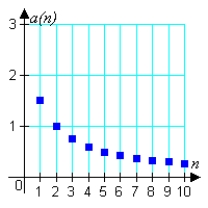
B)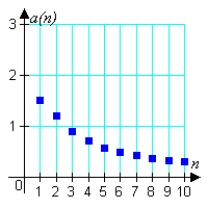
C)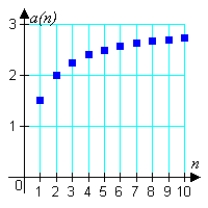
D)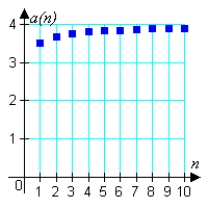
E)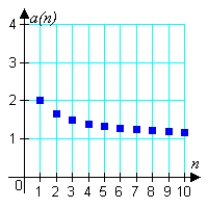

A)

B)

C)

D)

E)


Unlock Deck
Unlock for access to all 92 flashcards in this deck.
Unlock Deck
k this deck
17
Evaluate the series. 
A)
B)
C)
D)
E)

A)

B)

C)

D)

E)


Unlock Deck
Unlock for access to all 92 flashcards in this deck.
Unlock Deck
k this deck
18
Write an expression for the most apparent nth term of the sequence.(Assume that  begins with 1.)
begins with 1.) 
A)
B)
C)
D)
E)
 begins with 1.)
begins with 1.) 
A)

B)

C)

D)

E)


Unlock Deck
Unlock for access to all 92 flashcards in this deck.
Unlock Deck
k this deck
19
Write an expression for the apparent nth term of the sequence.(Assume that n begins with 1.) -3, 2, 7, 12, 17
A)
B)
C)
D)
E)
A)

B)

C)

D)

E)


Unlock Deck
Unlock for access to all 92 flashcards in this deck.
Unlock Deck
k this deck
20
Suppose the ratio  of alligators to pythons in a marshland from 2001 to 2008 can be approximated by the model
of alligators to pythons in a marshland from 2001 to 2008 can be approximated by the model 
 where
where  is the year, with
is the year, with  corresponding to
corresponding to  In 2006, the total number of alligators and pythons in the marsh was about 700.In that year, how many were alligators?
In 2006, the total number of alligators and pythons in the marsh was about 700.In that year, how many were alligators?
A) 62
B) 639
C) 57
D) 61
E) 638
 of alligators to pythons in a marshland from 2001 to 2008 can be approximated by the model
of alligators to pythons in a marshland from 2001 to 2008 can be approximated by the model 
 where
where  is the year, with
is the year, with  corresponding to
corresponding to  In 2006, the total number of alligators and pythons in the marsh was about 700.In that year, how many were alligators?
In 2006, the total number of alligators and pythons in the marsh was about 700.In that year, how many were alligators?A) 62
B) 639
C) 57
D) 61
E) 638

Unlock Deck
Unlock for access to all 92 flashcards in this deck.
Unlock Deck
k this deck
21
The seating section in a theater has 24 seats in the first row, 27 seats in the second row, and so on, increasing by 3 seats each row for a total of 19 rows.How many seats are in the tenth row?
A)
B)
C)
D)
E)
A)

B)

C)

D)

E)


Unlock Deck
Unlock for access to all 92 flashcards in this deck.
Unlock Deck
k this deck
22
Logs are stacked so that there are 21 logs in the bottom row, 20 logs in the second row from the bottom, and so on, decreasing by 1 log each row.How many logs are there in the first four rows from the bottom?
A) 140 logs
B) 60 logs
C) 78 logs
D) 153 logs
E) 165 logs
A) 140 logs
B) 60 logs
C) 78 logs
D) 153 logs
E) 165 logs

Unlock Deck
Unlock for access to all 92 flashcards in this deck.
Unlock Deck
k this deck
23
Consider a job offer with a starting salary of $37,700 and a given annual raise of $2325.Determine the total compensation from the company through three full years of employment.
A) $366,700
B) $312,725
C) $77,725
D) $423,000
E) $120,075
A) $366,700
B) $312,725
C) $77,725
D) $423,000
E) $120,075

Unlock Deck
Unlock for access to all 92 flashcards in this deck.
Unlock Deck
k this deck
24
Use summation notation to write the sum below. 
A)
B)
C)
D)
E)

A)

B)

C)

D)

E)


Unlock Deck
Unlock for access to all 92 flashcards in this deck.
Unlock Deck
k this deck
25
Find the nth term of the geometric sequence. 
A)
B)
C)
D)
E)

A)

B)

C)

D)

E)


Unlock Deck
Unlock for access to all 92 flashcards in this deck.
Unlock Deck
k this deck
26
Find a formula for  for the arithmetic sequence below.
for the arithmetic sequence below. 
A)
B)
C)
D)
E)
 for the arithmetic sequence below.
for the arithmetic sequence below. 
A)

B)

C)

D)

E)


Unlock Deck
Unlock for access to all 92 flashcards in this deck.
Unlock Deck
k this deck
27
Write the first five terms of the geometric sequence. 
A) -5, -2, 1, 4, 7
B) -5, -15, -45, -135, -405
C)
D)
E)

A) -5, -2, 1, 4, 7
B) -5, -15, -45, -135, -405
C)

D)

E)


Unlock Deck
Unlock for access to all 92 flashcards in this deck.
Unlock Deck
k this deck
28
Find the nth term of the geometric sequence. 
A)
B)
C)
D)
E)

A)

B)

C)

D)

E)


Unlock Deck
Unlock for access to all 92 flashcards in this deck.
Unlock Deck
k this deck
29
Match the geometric sequence with its graph from the choices below. 
A)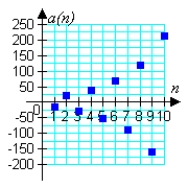
B)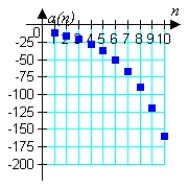
C)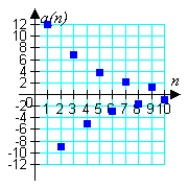
D)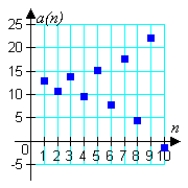
E)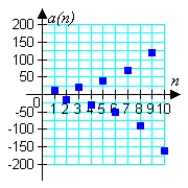

A)

B)

C)

D)

E)


Unlock Deck
Unlock for access to all 92 flashcards in this deck.
Unlock Deck
k this deck
30
Determine whether the sequence is geometric.If so, find the common ratio. -5, -15, -45, -135, ...
A) 3
B) -5
C)
D) -3
E) not geometric
A) 3
B) -5
C)

D) -3
E) not geometric

Unlock Deck
Unlock for access to all 92 flashcards in this deck.
Unlock Deck
k this deck
31
Find the sum of the integers from 31 to 61.
A) 1891
B) 30
C) 2852
D) 1426
E) 3782
A) 1891
B) 30
C) 2852
D) 1426
E) 3782

Unlock Deck
Unlock for access to all 92 flashcards in this deck.
Unlock Deck
k this deck
32
Match the arithmetic sequence with its graph from the choices below. 
A)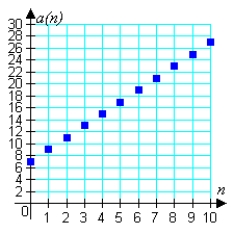
B)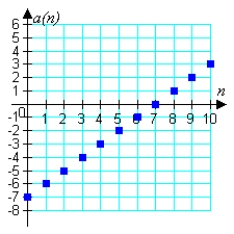
C)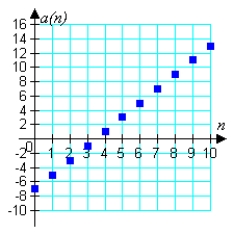
D)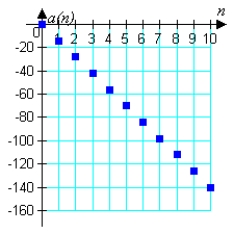
E)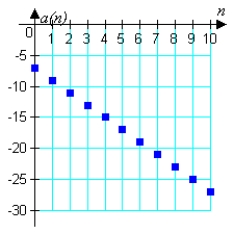

A)

B)

C)

D)

E)


Unlock Deck
Unlock for access to all 92 flashcards in this deck.
Unlock Deck
k this deck
33
Write the first five terms of the arithmetic sequence. 
A) 3, 10, 17, 24, 31
B) -4, -11, -18, -25, -32
C) 3, -4, -11, -18, -25
D) 3, -21, 147, -1029, 7203
E) 3, -4, -1, 2, 5

A) 3, 10, 17, 24, 31
B) -4, -11, -18, -25, -32
C) 3, -4, -11, -18, -25
D) 3, -21, 147, -1029, 7203
E) 3, -4, -1, 2, 5

Unlock Deck
Unlock for access to all 92 flashcards in this deck.
Unlock Deck
k this deck
34
Find the partial sum. 
A) -100,098
B) -99,102
C) -100,900
D) -101,103
E) -100,100

A) -100,098
B) -99,102
C) -100,900
D) -101,103
E) -100,100

Unlock Deck
Unlock for access to all 92 flashcards in this deck.
Unlock Deck
k this deck
35
A heavy object (with negligible air resistance) is dropped from a plane.During the first second of fall, the object falls 16.6 meters; during the second second, it falls 49.8 meters; during the third second, it falls 83.0 meters; and during the fourth second, it falls 116.2 meters.If this pattern continues, how many meters will the object fall in 10 seconds?
A) 813.4 meters
B) 597.6 meters
C) 1062.4 meters
D) 1660.0 meters
E) 1344.6 meters
A) 813.4 meters
B) 597.6 meters
C) 1062.4 meters
D) 1660.0 meters
E) 1344.6 meters

Unlock Deck
Unlock for access to all 92 flashcards in this deck.
Unlock Deck
k this deck
36
Find the indicated nth partial sum of the arithmetic sequence. 2.5, 3.8, 5.1, 6.4, ..., n = 100
A) 12,505
B) 6815
C) 6685
D) 6683.8
E) 6686.2
A) 12,505
B) 6815
C) 6685
D) 6683.8
E) 6686.2

Unlock Deck
Unlock for access to all 92 flashcards in this deck.
Unlock Deck
k this deck
37
Determine whether the sequence is geometric.If so, find the common ratio. -5, -2, 1, 4, ...
A) 3
B) -5
C)
D) -3
E) not geometric
A) 3
B) -5
C)

D) -3
E) not geometric

Unlock Deck
Unlock for access to all 92 flashcards in this deck.
Unlock Deck
k this deck
38
Find the indicated nth term of the geometric sequence. 6th term: 
A)
B)
C)
D)
E)

A)

B)

C)

D)

E)


Unlock Deck
Unlock for access to all 92 flashcards in this deck.
Unlock Deck
k this deck
39
The annual sales  (in millions of dollars) for a certain company from 2001 to 2006 can be approximated by the model
(in millions of dollars) for a certain company from 2001 to 2006 can be approximated by the model 
 where
where  represents the year, with
represents the year, with  corresponding to 2001.Find the total sales from 2001 to 2005.Round to the nearest million.
corresponding to 2001.Find the total sales from 2001 to 2005.Round to the nearest million.
A) $4119 million
B) $5427 million
C) $2972 million
D) $3295 million
E) $2003 million
 (in millions of dollars) for a certain company from 2001 to 2006 can be approximated by the model
(in millions of dollars) for a certain company from 2001 to 2006 can be approximated by the model 
 where
where  represents the year, with
represents the year, with  corresponding to 2001.Find the total sales from 2001 to 2005.Round to the nearest million.
corresponding to 2001.Find the total sales from 2001 to 2005.Round to the nearest million.A) $4119 million
B) $5427 million
C) $2972 million
D) $3295 million
E) $2003 million

Unlock Deck
Unlock for access to all 92 flashcards in this deck.
Unlock Deck
k this deck
40
Use a graphing utility to graph the first 10 terms of the sequence. 
A)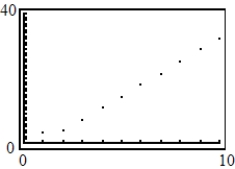
B)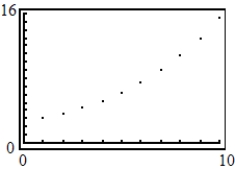
C)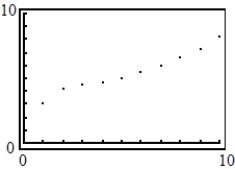
D)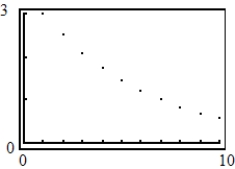
E)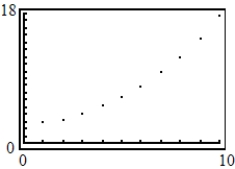

A)

B)

C)

D)

E)


Unlock Deck
Unlock for access to all 92 flashcards in this deck.
Unlock Deck
k this deck
41
Find the sum of the infinite geometric series below. 
A)
B)
C)
D)
E)

A)

B)

C)

D)

E)


Unlock Deck
Unlock for access to all 92 flashcards in this deck.
Unlock Deck
k this deck
42
Find the sum of the finite geometric sequence. 
A)
B)
C)
D)
E)

A)

B)

C)

D)

E)


Unlock Deck
Unlock for access to all 92 flashcards in this deck.
Unlock Deck
k this deck
43
Use the Binomial Theorem to expand the expression.Simplify your answer. 
A)
B)
C)
D)
E)

A)

B)

C)

D)

E)


Unlock Deck
Unlock for access to all 92 flashcards in this deck.
Unlock Deck
k this deck
44
Evaluate using Pascal's triangle.Show your work. 


Unlock Deck
Unlock for access to all 92 flashcards in this deck.
Unlock Deck
k this deck
45
Use the Binomial Theorem to expand the complex number.Simplify your result. 
A) -112 - 384i
B) -112 + 384i
C) 112 - 384i
D) 112 + 384i
E) 256

A) -112 - 384i
B) -112 + 384i
C) 112 - 384i
D) 112 + 384i
E) 256

Unlock Deck
Unlock for access to all 92 flashcards in this deck.
Unlock Deck
k this deck
46
Find the sum of the finite geometric series.Round to the nearest hundredth. 
A)
B)
C)
D)
E)

A)

B)

C)

D)

E)


Unlock Deck
Unlock for access to all 92 flashcards in this deck.
Unlock Deck
k this deck
47
Write the rational number  as the quotient of two integers in simplest form.
as the quotient of two integers in simplest form.
A)
B)
C)
D)
E)
 as the quotient of two integers in simplest form.
as the quotient of two integers in simplest form.A)

B)

C)

D)

E)


Unlock Deck
Unlock for access to all 92 flashcards in this deck.
Unlock Deck
k this deck
48
Use the Binomial Theorem to simplify the power of the complex number. 
A)
B)
C)
D)
E)

A)

B)

C)

D)

E)


Unlock Deck
Unlock for access to all 92 flashcards in this deck.
Unlock Deck
k this deck
49
Find the sum of the infinite geometric series. 
A)
B)
C)
D)
E) undefined

A)

B)

C)

D)

E) undefined

Unlock Deck
Unlock for access to all 92 flashcards in this deck.
Unlock Deck
k this deck
50
Evaluate the binomial coefficient. 
A)
B)
C)
D)
E)

A)

B)

C)

D)

E)


Unlock Deck
Unlock for access to all 92 flashcards in this deck.
Unlock Deck
k this deck
51
The annual profit  (in millions of dollars) for a certain company from 2000 to 2005 can be approximated by the model
(in millions of dollars) for a certain company from 2000 to 2005 can be approximated by the model 
 where
where  represents the year, with
represents the year, with  corresponding to 2000.Use the formula for the sum of a finite geometric sequence to approximate the total profit earned during this six-year period.Round to the nearest ten-thousand dollars.
corresponding to 2000.Use the formula for the sum of a finite geometric sequence to approximate the total profit earned during this six-year period.Round to the nearest ten-thousand dollars.
A) $4466.74 million
B) $4805.90 million
C) $3631.55 million
D) $3292.39 million
E) $2676.77 million
 (in millions of dollars) for a certain company from 2000 to 2005 can be approximated by the model
(in millions of dollars) for a certain company from 2000 to 2005 can be approximated by the model 
 where
where  represents the year, with
represents the year, with  corresponding to 2000.Use the formula for the sum of a finite geometric sequence to approximate the total profit earned during this six-year period.Round to the nearest ten-thousand dollars.
corresponding to 2000.Use the formula for the sum of a finite geometric sequence to approximate the total profit earned during this six-year period.Round to the nearest ten-thousand dollars.A) $4466.74 million
B) $4805.90 million
C) $3631.55 million
D) $3292.39 million
E) $2676.77 million

Unlock Deck
Unlock for access to all 92 flashcards in this deck.
Unlock Deck
k this deck
52
Use the Binomial Theorem to expand and simplify the expression. 
A)
B)
C)
D)
E)

A)

B)

C)

D)

E)


Unlock Deck
Unlock for access to all 92 flashcards in this deck.
Unlock Deck
k this deck
53
Use the Binomial Theorem to expand and simplify the expression. 
A)
B)
C)
D)
E)

A)

B)

C)

D)

E)


Unlock Deck
Unlock for access to all 92 flashcards in this deck.
Unlock Deck
k this deck
54
Evaluate using Pascal's triangle.Show your work. 


Unlock Deck
Unlock for access to all 92 flashcards in this deck.
Unlock Deck
k this deck
55
Expand the binomial by using Pascal's triangle to determine the coefficients.Show your work. 


Unlock Deck
Unlock for access to all 92 flashcards in this deck.
Unlock Deck
k this deck
56
Use summation notation to write the sum. 
A)
B)
C)
D)
E)

A)

B)

C)

D)

E)


Unlock Deck
Unlock for access to all 92 flashcards in this deck.
Unlock Deck
k this deck
57
Find the rational number representation of the repeating decimal. 
A)
B)
C)
D)
E)

A)

B)

C)

D)

E)


Unlock Deck
Unlock for access to all 92 flashcards in this deck.
Unlock Deck
k this deck
58
Calculate the binomial coefficient: 
A) 60
B) 15
C) 10
D) 1
E) 0

A) 60
B) 15
C) 10
D) 1
E) 0

Unlock Deck
Unlock for access to all 92 flashcards in this deck.
Unlock Deck
k this deck
59
Find the sum of the finite geometric series. 
A)
B)
C)
D)
E)

A)

B)

C)

D)

E)


Unlock Deck
Unlock for access to all 92 flashcards in this deck.
Unlock Deck
k this deck
60
Find the sum of the infinite geometric series. 
A)
B)
C)
D)
E)

A)

B)

C)

D)

E)


Unlock Deck
Unlock for access to all 92 flashcards in this deck.
Unlock Deck
k this deck
61
Find the coefficient a of the term in the expansion of the binomial. Binomial Term 

A) a = 12
B)
C) a = 32
D)
E)


A) a = 12
B)

C) a = 32
D)

E)


Unlock Deck
Unlock for access to all 92 flashcards in this deck.
Unlock Deck
k this deck
62
Find the number of distinguishable permutations of the group of letters. 
A)
B)
C)
D)
E)

A)

B)

C)

D)

E)


Unlock Deck
Unlock for access to all 92 flashcards in this deck.
Unlock Deck
k this deck
63
Decide which of the scenarios below should be counted using permutations or combinations. Scenario I:
Number of ways 7 people can line up in a row for concert tickets.
Scenario II:
Number of ways a team of 8 students can be selected from a group of 50 people.
Scenario III:
Number of ways a jury of 11 people can be selected from a group of 40 people.
A) Scenarios II and III are combinations and scenario I is a permutation.
B) All scenarios are permutations.
C) All scenarios are combinations.
D) Scenario III is a combination and scenarios I and II are permutations.
E) Scenarios I and II are combinations and scenario III is a permutation.
Number of ways 7 people can line up in a row for concert tickets.
Scenario II:
Number of ways a team of 8 students can be selected from a group of 50 people.
Scenario III:
Number of ways a jury of 11 people can be selected from a group of 40 people.
A) Scenarios II and III are combinations and scenario I is a permutation.
B) All scenarios are permutations.
C) All scenarios are combinations.
D) Scenario III is a combination and scenarios I and II are permutations.
E) Scenarios I and II are combinations and scenario III is a permutation.

Unlock Deck
Unlock for access to all 92 flashcards in this deck.
Unlock Deck
k this deck
64
At a high school cafeteria, diners can choose one vegetable from a choice of 4 vegetables, one meat from a choice of 3 meats, one serving of bread from among 4 breads, and a dessert from among 3 desserts.How many meal configurations are possible?
A) 14
B) 144
C) 4
D) 48
E) 36
A) 14
B) 144
C) 4
D) 48
E) 36

Unlock Deck
Unlock for access to all 92 flashcards in this deck.
Unlock Deck
k this deck
65
Find the specified nth term in the expansion of the binomial. 
A)
B)
C)
D)
E)

A)

B)

C)

D)

E)


Unlock Deck
Unlock for access to all 92 flashcards in this deck.
Unlock Deck
k this deck
66
Twenty-four students, of whom four are seniors, are selected as semifinalists for a literary award.Of the twenty-four students, twelve finalists will be selected.In how many ways can the twelve finalists contain two seniors?
A)
B)
C)
D)
E)
A)

B)

C)

D)

E)


Unlock Deck
Unlock for access to all 92 flashcards in this deck.
Unlock Deck
k this deck
67
In how many ways can a 12-question true-false exam be answered? (Assume that no questions are omitted.)
A) 4096
B) 65,536
C) 524,288
D) 1024
E) 1,048,576
A) 4096
B) 65,536
C) 524,288
D) 1024
E) 1,048,576

Unlock Deck
Unlock for access to all 92 flashcards in this deck.
Unlock Deck
k this deck
68
A combination lock will open when the right choice of three numbers (from 1 to 36) is selected.How many different lock combinations are possible?
A) 139,968
B) 1296
C) 36
D) 108
E) 46,656
A) 139,968
B) 1296
C) 36
D) 108
E) 46,656

Unlock Deck
Unlock for access to all 92 flashcards in this deck.
Unlock Deck
k this deck
69
Two six-sided dice are tossed.Find the probability that the sum is prime or even.
A)
B)
C)
D)
E)
A)

B)

C)

D)

E)


Unlock Deck
Unlock for access to all 92 flashcards in this deck.
Unlock Deck
k this deck
70
In a certain state, each automobile license plate number consists of two letters followed by a five-digit number.To avoid confusion between "O" and "zero" and "I" and "one", the letters "O" and "I" are not used.How many distinct license plate numbers can be formed?
A) 13,824,000
B) 57,600,000
C) 331,776,000
D) 5,760,000
E) 138,240,000
A) 13,824,000
B) 57,600,000
C) 331,776,000
D) 5,760,000
E) 138,240,000

Unlock Deck
Unlock for access to all 92 flashcards in this deck.
Unlock Deck
k this deck
71
Evaluate the expression. 
A) 3
B) 9
C) 6
D) 5
E) 8

A) 3
B) 9
C) 6
D) 5
E) 8

Unlock Deck
Unlock for access to all 92 flashcards in this deck.
Unlock Deck
k this deck
72
There are 13 patients in Dr.Ziglar's waiting room.Dr.Ziglar can see 6 patients before lunch.In how many different orders can Dr.Ziglar see 6 of the patients before lunch?
A) 1716
B) 8,648,640
C) 78
D) 6
E) 1,235,520
A) 1716
B) 8,648,640
C) 78
D) 6
E) 1,235,520

Unlock Deck
Unlock for access to all 92 flashcards in this deck.
Unlock Deck
k this deck
73
Twenty-four students are selected as semifinalists for a literary award.Of the twenty-four students, fourteen finalists will be selected.In how many ways can fourteen finalists be selected from the twenty-four students?
A) 38,760
B) 319,770
C) 4,457,400
D) 1,961,256
E) 116,280
A) 38,760
B) 319,770
C) 4,457,400
D) 1,961,256
E) 116,280

Unlock Deck
Unlock for access to all 92 flashcards in this deck.
Unlock Deck
k this deck
74
Evaluate: 9P6
A) 84
B) 504
C) 60,480
D) 54
E) undefined
A) 84
B) 504
C) 60,480
D) 54
E) undefined

Unlock Deck
Unlock for access to all 92 flashcards in this deck.
Unlock Deck
k this deck
75
A coin is tossed three times.Find the probability of getting two heads.
A)
B)
C)
D)
E)
A)

B)

C)

D)

E)


Unlock Deck
Unlock for access to all 92 flashcards in this deck.
Unlock Deck
k this deck
76
A computer randomly generates an integer from 1 through 50.Find the probability of the event that a multiple of 8 is generated.
A)
B)
C)
D)
E)
A)

B)

C)

D)

E)


Unlock Deck
Unlock for access to all 92 flashcards in this deck.
Unlock Deck
k this deck
77
A computer manufacturer offers a computer system with five different disk drives, two different monitors, and three different keyboards.How many different computer systems could a consumer purchase from this manufacturer?
A) 24
B) 40
C) 30
D) 18
E) 75
A) 24
B) 40
C) 30
D) 18
E) 75

Unlock Deck
Unlock for access to all 92 flashcards in this deck.
Unlock Deck
k this deck
78
Determine the number of ways a computer can randomly generate an integer divisible by 4 from 1 through 15.
A) 7
B) 3
C) 11
D) 5
E) 9
A) 7
B) 3
C) 11
D) 5
E) 9

Unlock Deck
Unlock for access to all 92 flashcards in this deck.
Unlock Deck
k this deck
79
Eight cards are chosen at random from a standard deck of playing cards.In how many ways can the cards be chosen if all eight cards are diamonds.
A)
B)
C)
D)
E)
A)

B)

C)

D)

E)


Unlock Deck
Unlock for access to all 92 flashcards in this deck.
Unlock Deck
k this deck
80
A state lottery game requires a person to select nine different numbers from thirty-six numbers.The order of the selection is not important.In how many ways can this be done?
A)
B)
C)
D)
E)
A)

B)

C)

D)

E)


Unlock Deck
Unlock for access to all 92 flashcards in this deck.
Unlock Deck
k this deck


